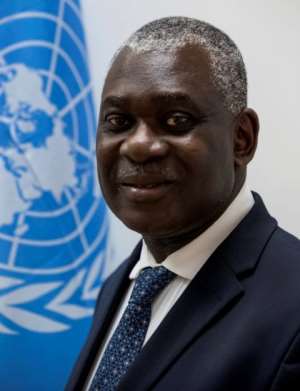
By Desmond Davies, London Bureau
London, April 20, GNA - The Sudanese government has opened border crossings with South Sudan in order to allow the flow of humanitarian aid to South Sudanese victims of the famine that is ravaging not just their country but Somalia as well.
According to UN agencies, 7.5 million people in South Sudan are in need of food aid and humanitarian assistance, while 3.5 million of them are either internally displaced or are refugees in neighbouring countries.
A Sudanese government official told the GNA in London: 'The government of Sudan has been facilitating the flow of food assistance through Port Sudan.
'Sudan has created channels of communication and coordination with UN agencies, particularly with the World Food Programme, to facilitate the flow of food to South Sudan.
'Emergency packages of food have been donated by Sudan from its own reserves to support the people of South Sudan.'
He also told the GNA that Sudan had taken in 365,000 South Sudanese refugees in the last year as a civil war raged in the country, with 60,000 arriving in the first three months of this year as the famine intensified.
A committee chaired by former President Abdul Rahman Sawar al-Dahab is organising the Sudanese effort to send food to South Sudan while at the same time aiding South Sudanese refugees in Sudan.
When the UN declared a famine in South Sudan and Somalia, it was the first time since 2011 that it had done so anywhere in the world.
South Sudan became independent in 2011, after the South Sudanese people voted overwhelmingly in a referendum to sever links with Sudan, but the politicians who took over have not been able to provide development and security for their people.
The situation was made worse when a civil war broke out in December 2013 when President Salva Kiir and Vice President Riek Machar took up arms following a personal dispute.
The war has forced more than a million people to seek refuge in neighbouring countries, including Sudan.
A UN peacekeeping force of some 11,000 troops from more than 50 countries is trying to staunch the political, economic and social instability that sent the country to civil conflict.
To add to the problem, humanitarian workers are being targeted by South Sudanese warring factions.
Earlier this month, three aid workers were killed, bringing the total of those who have died to 82, according to the UN.
The situation is dire, according to Eugene Owusu, Deputy Special Representative of the UN Secretary General and the UN Resident and Humanitarian Coordinator in South Sudan.
He said in Juba this week that without peace in South Sudan, millions of people would go hungry.
'While humanitarians will continue to do all that is possible to alleviate suffering, the fact remains that unless the guns fall silent, the humanitarian situation will continue to deteriorate,' Mr Owusu said.
GNA




 There’s nothing you can do for us; just give us electricity to save our collapsi...
There’s nothing you can do for us; just give us electricity to save our collapsi...
 Ghanaian media failing in watchdog duties — Sulemana Braimah
Ghanaian media failing in watchdog duties — Sulemana Braimah
 On any scale, Mahama can't match Bawumia — NPP Youth Organiser
On any scale, Mahama can't match Bawumia — NPP Youth Organiser
 Never tag me as an NPP pastor; I'm 'pained' the 'Akyem Mafia' are still in charg...
Never tag me as an NPP pastor; I'm 'pained' the 'Akyem Mafia' are still in charg...
 Your refusal to dedicate a project to Atta Mills means you never loved him — Kok...
Your refusal to dedicate a project to Atta Mills means you never loved him — Kok...
 2024 elections: I'm competent, not just a dreamer; vote for me — Alan
2024 elections: I'm competent, not just a dreamer; vote for me — Alan
 2024 elections: Forget NPP, NDC; I've the Holy Spirit backing me and nothing wil...
2024 elections: Forget NPP, NDC; I've the Holy Spirit backing me and nothing wil...
 2024 elections: We've no trust in judiciary; we'll ensure ballots are well secur...
2024 elections: We've no trust in judiciary; we'll ensure ballots are well secur...
 Performance tracker: Fire MCEs, DCEs who document Mahama's projects; they're not...
Performance tracker: Fire MCEs, DCEs who document Mahama's projects; they're not...
 Train crash: Railway ministry shares footage of incident
Train crash: Railway ministry shares footage of incident
